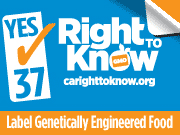UC-Davis paper criticizing Prop 37 is wrong on zero tolerance
By Ken Roseboro
Published: October 1, 2012
Category: GM Food Labeling and Regulations
A paper published by a professor and doctoral students at the University of California at Davis criticizing a state initiative—Proposition 37—to label genetically modified foods contains a glaring mistake.
The authors of the paper claim that Proposition 37 would set a “zero tolerance” threshold for accidental contamination of GM material. The authors write that Proposition 37 would “apply the strictest threshold level for unintentional traces of GM ingredients of any international mandatory labeling scheme, including that of the European Union (EU) where the threshold is 0.9% for adventitious (accidental) presence of GM. The California initiative would implement a zero-tolerance policy for accidental presence of small amounts of GM substances, even if the U.S. government has approved the GM material for human consumption.”
The authors go on to say that “It will be impossible for farmers and the food industry to comply with such an impractical tolerance standard.”
Not a zero tolerance policy
The reality is that Proposition 37 does not establish a zero tolerance policy. Proposition 37 is a process-based standard and not one based on end-product testing as most GM food labeling regulations are in other nations. Therefore if a farmer or food manufacturers does not intentionally use GM seed or ingredients—if they source non-GMO alternatives—and can provide documentation showing this, then the resulting food product would not have to be labeled even if there is accidental GMO contamination during production of that product.
Under a zero tolerance policy, a farmer or processor could take steps to source non-GMO seed or ingredients, but if there is accidental GMO contamination that product would have to be labeled.
Authors of the UC-Davis paper are also wrong when they state that verified non-GM labeled foods “will virtually disappear from food stores” because of the zero tolerance criterion.
In reality, companies whose products verified with the Non-GMO Project would be exempt from GM food labeling because they would have documentation showing that they sourced non-GMO seed and ingredients and took steps to prevent GMO contamination.
© Copyright The Organic & Non-GMO Report, October 2012





